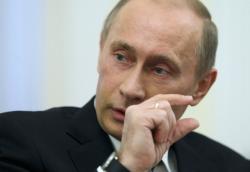On December 28, Russian President Vladimir Putin signed into law a bill banning U.S. citizens from adopting Russian children.
His move was taken in response to the passage of America’s Magnitsky Act on December 14. This act, a successor to the Cold War-era Jackson-Vanik amendment which linked Soviet emigration to trade, was named after Sergei Magnitsky, a Russian lawyer who uncovered a $230 million Interior Ministry embezzlement scheme which Foreign Policy magazine labeled Russia’s “crime of the century.” In revenge for exposing its corruption, the Interior Ministry ordered Magnitsky’s arrest in 2008. He was tortured and murdered in prison. The Magnitsky Act sanctions Russia’s worst human rights violators by denying them U.S. visas and freezing their assets in U.S. banks.
To protest the passage of the Magnitsky Act, Putin and his United Russia Party have targeted orphans, the most defenseless constituency in Russia. According to prominent Russian commentator Yulia Latynina, Russia now has 600,000 orphans, more than the Soviet Union had during World War II. Conditions in Russian orphanages are well known: children face routine abuse and neglect. They are often bound, made to lie in their own urine and excrement, and sent to asylums.
Their best hope is adoption. Since 1991, Americans have adopted somewhere between 50,000 and 100,000 Russian children, including disabled children, who are most at risk in Russian institutions. These adopted children thrive. True, Russian officials say that 19 Russian children adopted by Americans have died. Putin says their abusers have not been held accountable by U.S. courts. These deaths are tragic, but Putin’s crocodile tears run dry. As Vladimir Kara-Murza, senior advisor at the pro-reform Institute for Modern Russia, notes, between 1991 and 2006 more than 1,200 adopted children died in Russian families.
Many Russians recognize that Putin has gone too far. A recent Levada Center poll showed that 39 percent of Russian citizens support the Magnitsky Act. While this may not seem like much, for the Russian public, which is very skeptical of Americans, it is. The Magnitsky Act hits Russia’s human rights abusers where it hurts — their wallets. And Russian citizens who are tired of the corruption that stifles Russia’s growth appreciate this.
If Putin were serious about improving U.S.-Russian relations and making Russia democratic, he would punish those responsible for Magnitsky’s murder. Instead, many of the officials implicated in Magnitsky’s death have received promotions. Only prison doctor Dmitry Kratov has been charged. But despite Russia’s 99 percent conviction rate, on December 28 a Russian court set Kratov free, just as the Russian ban on U.S. adoptions passed.
The ban on U.S. adoptions will only worsen Putin’s image, both at home and abroad. The American response will be important. The White House opposed the Magnitsky Act’s most biting prescriptions, and John Kerry — President Obama’s nominee to be secretary of state — used his chairmanship of the Senate Foreign Relations Committee to ensure the bill’s dilution. Putin’s callousness should show Obama that his cornerstone “reset” policy with Russia has long since reached its limits.
Anna Borshchevskaya is an assistant director in the Dinu Patriciu Eurasia Center at the Atlantic Council. This piece was first published in The Daily Caller.
Image: vladimir-putin-vote-photo.warsawbiopic.jpg
